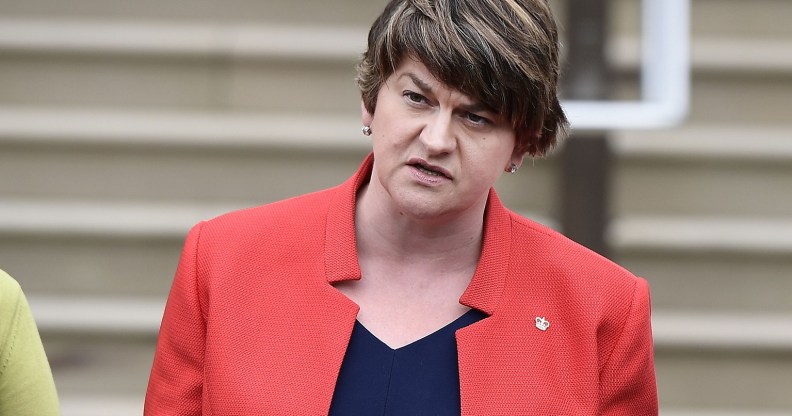Northern Ireland goes to the polls as anti-LGBT Arlene Foster vows to win

DUP leader Arlene Foster (Charles McQuillan/Getty)
DUP leader Arlene Foster (Charles McQuillan/Getty)
Northern Ireland is voting for a new government today.
It’s the second time voters have gone to the polls in 10 months, after a previous power sharing deal broke down.
Voting in the assembly election is said to be “steady in all places”, the electoral office has said.
It comes after the collapse of a power-sharing agreement which was led by First Minister Arlene Foster, an opponent of same-sex marriage.
Northern Ireland is the only part of the UK not to have marriage equality, which Foster has pledged to continue to oppose if re-elected today.
228 candidates are competing for 90 seats – down from 108 in the previous set of elections – across 18 constituencies today.
When all of the 90 seats have been filled, the two biggest unionist and nationalist parties will get together to try to form a new government.
President of the NUS in Northern Ireland, Fergal McFerran, told PinkNews: “Many commentators are making a variety of predictions about whether we’ll have devolved government or direct rule at the end of this election period.
“I sincerely hope that we have devolved government, and specifically a devolved government that respects the rights of our LGBT citizens and fights to eradicate discrimination and bigotry in all of its forms.”
Sinn Féin had called for Arlene Foster to quit as First Minister over her involvement in a botched energy scheme she oversaw while Minister for Enterprise, Trade and Investment, which has been hit with serious allegations of corruption.
The scandal caused the collapse of the country’s power-sharing agreement, with Sinn Féin’s Martin McGuinness resigning as Deputy First Minister.
Ms Foster reaffirmed plans to continue employing powers to block any future marriage legislation. She recently defended her actions by insisting gay people don’t really want to get married anyway.
She said: “This suggestion that every single person who’s a homosexual wants to change the definition of marriage is actually wrong.
“I know plenty of people in that community who don’t want to see marriage redefined and are quite content to live in partnership… it’s all become a bit of a storm in a teacup.”

